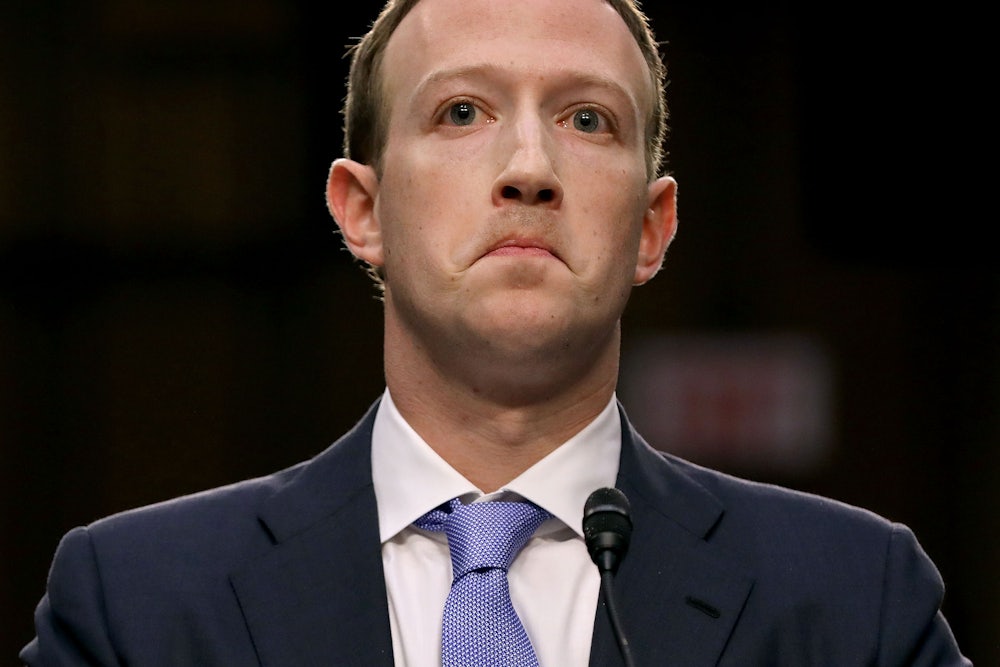Is there crying in the Metaverse? On Thursday, Facebook CEO Mark Zuckerberg warned his staff during an all hands meeting that he might tear up, citing a “scratched eye.” But Zuckerberg had reason to be weepy: His company’s stock had fallen 26 percent, wiping out more than $200 billion in market value, after a disastrous earnings forecast.
The reasons for the company’s struggles are relatively straightforward. The firm, recently rechristened Meta, has poured billions into trying to make the “metaverse”—broadly speaking, a kind of virtual reality world where you do most of the stuff you do in the real world, i.e., waste time, buy stuff, and get preyed on by a dizzying array of cybercriminals—a thing. Zuckerberg has been open about the fact that this may take years, possibly even decades to see through and there are understandable doubts about its potential, particularly given the awkward, cringey, and dull teasers the company has put out in an effort to foment some enthusiasm for the project.
More importantly, Facebook’s core business—data and advertising—is struggling. A single Apple iOS update that started blocking third-party apps from tracking users has cost Facebook billions. At the same time, the company has been hemorrhaging users for the first time while younger people shun it altogether, favoring apps like TikTok. As The Washington Post reported, “Facebook lost daily users for the first time in its 18-year history—falling by about half a million users in the last three months of 2021, to 1.93 billion logging in each day.” Without question, it was Zuckerberg’s worst day as CEO of Meta or, for that matter, Facebook—a moment that suggested the company’s high-water mark had been reached.
Where does Facebook go from here? It’s still profitable—very profitable, raking in $39 billion last year. But “profitable” often doesn’t cut it when it comes to tech companies. The goal is only endless growth and total domination, and Facebook is suddenly losing the race to own the present while its longer-term ambition—controlling the virtual reality world—is far off and may never materialize. (Based on the extremely depressing and downright chintzy glimpses of it that have emerged, I truly hope that it never materializes.) Zuckerberg himself acknowledged this on Thursday, saying, “Although our direction is clear, it seems that our path ahead is not quite perfectly defined.” Zuckerberg has never been the most inspiring or cogent communicator, but it’s a revealing statement: The company has a vague notion of where it wants to go and no idea how to get there.
A hilarious stop-gap measure has been proposed for the short term: Zuckerberg has said that the company will pivot to video … again. It has recently introduced Reels, an Instagram short-form video product that’s aimed to compete with TikTok for the attention of teens and twentysomethings. Citing the “unprecedented level of competition” from the app, Zuckerberg told employees Facebook would pour even more time and money into its TikTok copycat. (Some fresh ideas might be advisable, seeing as some of the most commonly uploaded videos to Instagram’s Reels are just copies of TikToks.)
I must admit to feeling more than a little bit of schadenfreude in Facebook’s latest change in direction. Five years ago, during Facebook’s first big pivot to video, the company encouraged publishers to dump scant resources into producing expensive, well-produced videos that it would then heavily promote on its platform. In theory, this promised a brand-new revenue stream for publishers, something desperately needed in the mid-2000s media world.
But the rewards never materialized because Facebook’s promises were always based on a lie—Facebook users actually didn’t want more videos, and they didn’t really watch them even when they were well made. Moreover, the metrics Facebook provided to publishers to push the pivot were juked—ultimately leading to a lawsuit from advertisers. For media companies—and, more importantly, for journalists—the result was a near-extinction-level event. Desperately chasing the pivot-to-video dragon, companies laid off journalists so they could pivot to video. Then when the pivot to video failed, they laid off more; some ceased to exist altogether.
The result was, at the very least, hundreds of lost media jobs and a waste of time and money. For years, companies chased ad revenue on Facebook’s false promise, during which time they forsook alternate strategies and, in many cases, a real investment in actual journalism. Facebook wasn’t solely responsible: Craven media executives, many of whom had little idea what they were doing, gleefully followed its lead in a futile hope for riches. But Facebook was the progenitor of the crisis, and it has never really faced any reckoning for it, beyond the aforementioned lawsuit, which resulted in a $40 million judgment—a pittance for a company raking in tens of billions in profit every year.
Well, now it’s Facebook’s turn to get mired in a pivot to video that it can’t quite escape. The company is desperate and stuck; it’s losing users for the first time, and it can’t seem to figure out how to get new ones. Its best idea is to copy one of its competitors, and yet Reels continues to lag behind TikTok. Its worst idea is to build a clone of Second Life so that people can do the things they’re already doing online, only in a more complicated and unfun fashion, while clad in digital avatars. Facebook is in crisis, and it only has itself to blame.










